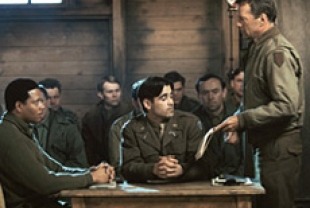This riveting World War II drama set in a German prison camp is a superb moral suspense story. Unlike several recent military flicks, this one does not put the accent on hand-to-hand combat, gigantic explosions, and gung ho violence. What is presented on the screen is much more interesting — a group of Yank prisoners trying to come to terms with shadow elements of the American soul.
Gregory Hoblit directs this engrossing drama adapted from a novel by John Katzenbach, who served as Attorney General of the United States under President Lyndon Johnson. The screenplay by Billy Ray and Terry George is based on the prisoner of war experiences of his father Nicholas.
The pampered and privileged main character is Lt. Tommy Hart (Colin Farrell), a U.S. Senator's son and Yale law student. After surviving an Allied Air attack on the freight cars carrying POWs and a forced march in the midst of winter, he arrives in a very crowded Nazi prison camp run by Col. Werner Visser (Marcel Iures, in a scene-stealing performance of incredible depth and subtlety), a devotee of Mark Twain and jazz.
Col. William McNamara (Bruce Willis) is the highest ranking American officer — a fourth-generation West Pointer who's tough as nails and a shrewd judge of character. Assessing Hart as a person of questionable courage and values, he assigns him to live with the enlisted men. The Yalie is given some new boots by Sgt. Vic W. Bedford (Cole Hauser), the camp wheeler-dealer. But this fellow's true colors come to the fore when McNamara also assigns Lt. Lincoln Scott (Terrence Howard) and Lt. Lamar Archer (Vicellous Shannon), members of the 333rd Flying Corps of black airman, to this same residence. Bedford's racial hatred flames up and shortly thereafter a contraband metal spike is planted in Archer's bed. The Nazis execute him. Then Bedford is murdered and all signs point to Scott, who vowed to avenge the death of his friend.
The tension in the Nazi POW camp really sizzles when McNamara convinces Col. Visser to hold a trial to determine Scott's guilt or innocence. Hart finds himself ill-equipped to handle the African American's defense up against a fully-trained lawyer on the opposite side. In addition, he is not prepared for the raft of surprises that surface during the trial.
It is not very often that an American war movie deals with the shadow side of our culture — racial prejudice in all of its ugly and diverse forms. In several powerful speeches, Scott tells of the various injustices suffered in the service of his homeland. Although Hart's War ends with a nod to the virtue of honor, the real moral value that deserves emphasis is a patriotism that doesn't flinch from the demonic aspects of the American soul.
